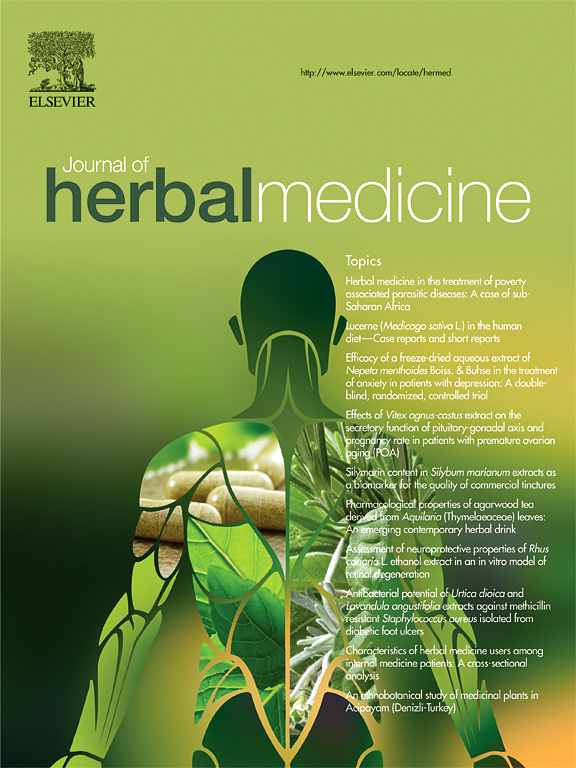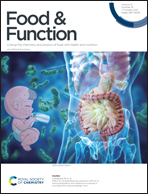Orange
How to submit an article:
- Registered users can submit any published journal article that has a unique DOI (Digital Object Identifier) name or link to Research Hub.
- For example, you can paste the full DOI link:
https://doi.org/10.1109/5.771073or just the DOI name:10.1109/5.771073into the field above and click submit. - The person who is first to submit a valid article to Research Hub will forever be credited for it, and every article submission earns you +6 Research Points.
Published research studies are articles that present the findings of original research that has undergone a peer-review process and has been made publicly available in scholarly journals, books or other media.

Phytochemistry and biological activities of Citrus sinensis and Citrus limon: an update
2023 Sep Journal of Herbal Medicine Zahr S, Zahr R, El Hajj R, Khalil M
Sweet orange and lemon fruits are rich in secondary metabolites and vitamins, serving as potential sources of antioxidant agents, exhibiting antibacterial, antifungal, and anticancer activities. Further studies are encouraged to explore the therapeutic usage of citrus phytochemicals.
Review Article Anticancer Antifungal Antibacterial Orange Lemon
Carotenoids in orange carrots mitigate non-alcoholic fatty liver disease progression
2022 Sep 26 Frontiers in Nutrition Balbuena E, Cheng J, Eroglu A
Experimental Study Animal Study Carrot Orange NAFLDCarotenoid-rich foods like orange carrots were more effective in mitigating Non-alcoholic fatty liver disease than those with low carotenoid levels.

Role of Citrus Fruit Juices in Prevention of Kidney Stone Disease (KSD): A Narrative Review
2021 Nov 17 Nutrients Barghouthy Y, Somani BK
Grapefruit juice was identified as a risk factor for stone formation in large epidemiological studies, while orange juice was not associated with an increased risk for KSD. Orange and grapefruit juices had an alkalinizing effect on urine, while lemon juice raised urinary citrate levels but lacked a significant alkalinizing effect.
Systematic Review Review Article Grapefruit Juice Kidney Stone Lemon
Fruits and their impact on the gut microbiota, gut motility and constipation
2021 Jan Food & Function Katsirma Z, Dimidi E, Rodriguez-Mateos A, Whelan K
Review Article Raisins Prunes Gut Microbiota Fruits ConstipationEating fruits such as blueberry, prunes, kiwi, and raisins positively influences gut bacteria leading to improved bowel movements and constipation relief.
Research insights are moderated by the Research Hub team and offer an at-a-glance overview of interesting research findings.

2022 Frontiers in Nutrition
Carotenoid-rich foods like orange carrots were more effective in mitigating Non-alcoholic fatty liver disease than those with low carotenoid levels.
Experimental Study Carrot NAFLD
Carotenoids in orange carrots mitigate non-alcoholic fatty liver disease progression
Balbuena E, Cheng J, Eroglu A

2021 Food & Function
Eating fruits such as blueberry, prunes, kiwi, and raisins positively influences gut bacteria leading to improved bowel movements and constipation relief.
Review Article Constipation Fruits Gut Microbiota Prunes Raisins
Fruits and their impact on the gut microbiota, gut motility and constipation
Katsirma Z, Dimidi E, Rodriguez-Mateos A, Whelan K
Review Articles
Review articles summarise and critically evaluate the current state of research on a specific topic or field by synthesising multiple primary research studies.

Phytochemistry and biological activities of Citrus sinensis and Citrus limon: an update
2023 Sep Journal of Herbal Medicine Zahr S, Zahr R, El Hajj R, Khalil M
Sweet orange and lemon fruits are rich in secondary metabolites and vitamins, serving as potential sources of antioxidant agents, exhibiting antibacterial, antifungal, and anticancer activities. Further studies are encouraged to explore the therapeutic usage of citrus phytochemicals.
Review Article Anticancer Antifungal Antibacterial Orange Lemon
Role of Citrus Fruit Juices in Prevention of Kidney Stone Disease (KSD): A Narrative Review
2021 Nov 17 Nutrients Barghouthy Y, Somani BK
Grapefruit juice was identified as a risk factor for stone formation in large epidemiological studies, while orange juice was not associated with an increased risk for KSD. Orange and grapefruit juices had an alkalinizing effect on urine, while lemon juice raised urinary citrate levels but lacked a significant alkalinizing effect.
Systematic Review Review Article Grapefruit Juice Kidney Stone Lemon
Fruits and their impact on the gut microbiota, gut motility and constipation
2021 Jan Food & Function Katsirma Z, Dimidi E, Rodriguez-Mateos A, Whelan K
Review Article Raisins Prunes Gut Microbiota Fruits ConstipationEating fruits such as blueberry, prunes, kiwi, and raisins positively influences gut bacteria leading to improved bowel movements and constipation relief.
Clinical Trials
Clinical trials are research studies that involve people and are conducted to evaluate the safety and efficacy of new treatments or interventions, such as drugs, medical devices, or behavioural therapies.
Study Protocols
Published study protocols are detailed plans that outline the objectives, methodology, statistical analyses, and organisation of a research study that have been made publicly available for others to review and use as a reference.
Presentation Slides

Experimental Study
Carotenoid-rich foods like orange carrots were more effective in mitigating Non-alcoholic fatty liver disease than those with low carotenoid levels.
Balbuena E, Cheng J, Eroglu A

Review Article
Eating fruits such as blueberry, prunes, kiwi, and raisins positively influences gut bacteria leading to improved bowel movements and constipation relief.
Katsirma Z, Dimidi E, Rodriguez-Mateos A, Whelan K
Executive Summary
Write an executive summary in the form of a blog article on the topic of "Research into Chinese medicine treatment for Orange" summarising the research below and using language that can be easily understood by patients and avoiding medical jargon using a professional and caring tone of voice.
Write an executive summary in the form of a blog article on the topic of "Researched Chinese medicine treatments for Orange" summarising the research below in an objective and easy to understand way, and using language that can be easily understood by patients. Group the article into Chinese medicine treatments first, followed by nutrition and other treatments. Avoid using medical jargon and use a professional and caring tone of voice.
Write me a concise but easy to understand executive summary on the topic of "Chinese medicine treatments for Orange" based on the following research that I will give you. Your summary should be 2 paragraphs long in Australian English spelling and include references to the studies.
A Experimental Study published in 2022 in the journal Frontiers in Nutrition found that Carotenoid-rich foods like orange carrots were more effective in mitigating Non-alcoholic fatty liver disease than those with low carotenoid levels. In this study, male C57BL/6J mice were randomly assigned to one of four experimental diets for a period of 15 weeks: a low-fat diet, a high-fat diet, a high-fat diet with 20% white carrot powders, or a high-fat diet with 20% orange carrot powders. Observations revealed that those mice on the high-fat diet enriched with carotenoids from the orange carrots gained less weight and displayed less hepatic lipid deposition compared to the white carrot group. Moreover, lower levels of triglyceride content were seen in the orange carrot group. The increase of particular proteins indicated that carotenoids found in orange carrots improved β-oxidation, thereby inhibiting NAFLD development more significantly. Further examination showed noticeably higher mRNA and protein levels of a particular transcription factor.
A Review Article published in 2021 in the journal Food & Function found that Eating fruits such as blueberry, prunes, kiwi, and raisins positively influences gut bacteria leading to improved bowel movements and constipation relief. The research was conducted via a comprehensive review of animal and human studies investigating the impact of various fruits on gut motility and intestinal microbiota. Techniques used to gather data included electronic database searches, hand searches, and expert consultation. Fruits evaluated in the review included blueberries, prunes, kiwi fruit, and raisins, with an emphasis placed on their fiber, sorbitol, and (poly)phenol content. Each fruit's influence was studied in relation to its potential to modify gut microbiota and its consequences on gut motility and constipation. In the subsequent analysis, Blueberry powder was found to influence certain gut bacteria like lactobacilli and bifidobacteria, prunes contributed to the growth of bifidobacteria, kiwi fruit impacted Bacteroides, and raisins had an effect on Ruminococcus. Apart from these, other fruits like apples (through apple fiber isolate), oranges (orange extract), and fig (fig paste) were also cited for their crucial effects on gut transit time and overall digestive health. The mechanism behind these effects, the specific components playing a role, as well as the potential synergistic effects of multiple components were also explored, albeit limitedly.
Moderation Tools
Topic
Sign In
Users not signed in are limited to viewing the 5 most recent items of content.